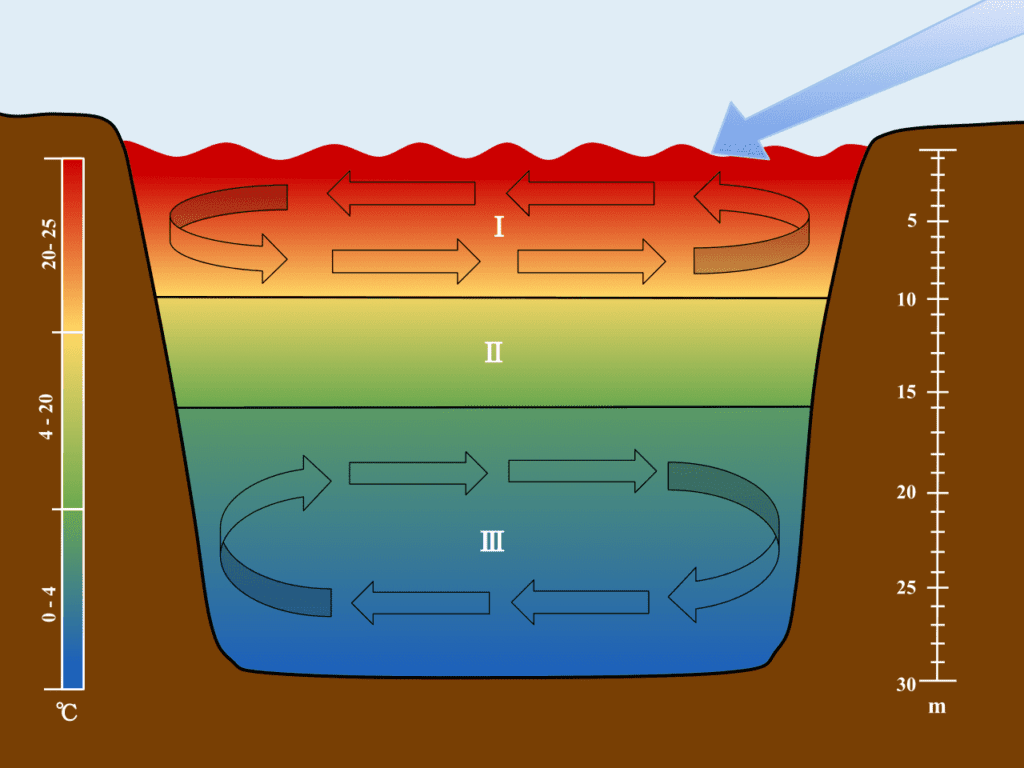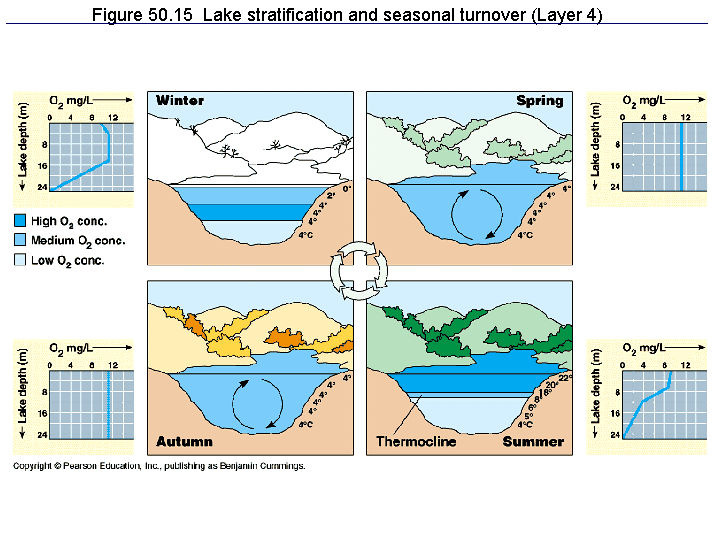

Regardless, almost all fish are found in this top layer of your pond. As summer progresses, however, the epilimnion typically shrinks in size. The depth to which the epilimnion reaches depends on the clarity of the pond’s waters and the terrain in which it is located. The temperature of water in this layer increases throughout the summer. This zone is well oxygenated because of its constant contact with the atmosphere (wind action) and because of oxygen produced by the aquatic plants found there. Of the three, temperature is the most readily measured parameter and for this reason this summer process is often known as “thermal stratification.” The uppermost level, known as the epilimnion, is composed of warm, lighter water. Because of these differing physical properties, they do not readily mix.

Don’t let dock talk about the fall turnover scare you off the water this year.During the summer, ponds “stratify” into three layers of water with differing temperatures, densities, and levels of dissolved oxygen. You certainly won’t catch them on the couch. BUT, they still live there and still have to eat. The bottom line is – yes, the fishing may be a bit tough for a few days or even a couple of weeks. I will usually opt for smaller line and make frequent lure changes in a given area to see if I can get bit on one bait or another to try and give myself confidence in one particular bait or technique for that given day. One big tip here is I will dip the tail of my soft plastics in I SPIKE IT dipping dye 90 percent of the time. Great baits to try are a Carolina Rigged Lake Fork Trophy Lures Ring Fry, a weightless wacky rigged 6th Sense Divine Shakey Worm or a smaller jig like a Santone Lures Texas Finesse Jig. These areas include main lake points, creek mouths, channel banks and offshore humps. I like to use smaller worms, jigs and creature baits worked very slowly and methodically in high-percentage areas. The other, more subtle approach will involve smaller baits and more finesse techniques. This is a larger than average crankbait and will give the fish a larger profile as the baitfish have been growing all summer long and it will provide some great triggering qualities as it bangs off of stumps, boat docks or whatever cover you have available. I will go for a shock-and-awe approach with a bait like a 6th sense Cloud 9 Magnum Square Bill crankbait in Sexified Shad or Blacklight Craw color. How do I catch fish during the turnover? I have had much better experience fishing slightly shallower than I normally would and try one of two techniques. If these natural bodies of water do turnover, it is usually less drastic than a typical reservoir or impoundment. Large lakes that have river-fed systems and natural lakes that have a constant in-flow of fresh water will typically not turn over the way a man-made impoundment will. That can be as little as a few days, but it can take several weeks for most lakes to fully turnover.ĭo all lakes turnover in the fall? No. I personally feel like the bass in the deeper water will be much harder to catch during the turnover. The last group forage from deep to shallow on a frequent basis. Some bass prefer to stay relatively shallow their entire lives, while others stay relatively deep and only move shallow to spawn. Now, that being said, they are NOT all alike. How does it affect your fishing? Fish are creatures of habit that move systematically with changing weather conditions. The turnover can cause fish kills in some areas, but it is more common on smaller lakes with little moving water or in backwater creek areas where fish can’t escape the water that is lacking oxygen. It makes the water off-colored and even muddy in some areas. I know fishermen that won’t even hook onto the boat when their lake is turning over. In most cases you will periodically see small bubbles coming from the bottom all the way to the surface. When a lake turns over, what is happening is that the cooler water on the bottom of the lake will mix with the warmer water at the top of the lake for a brief time period. What exactly is it and how does it affect your fishing?

When you mention your lake is turning over, you will seldom get a favorable or excited response from other anglers.
LAKE TURNOVER FULL
As September is in full swing, the two words “fall turnover” will be uttered by just about every angler on the water.


 0 kommentar(er)
0 kommentar(er)
